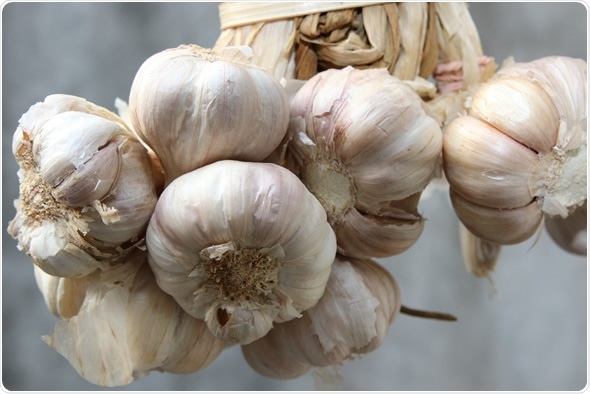Although there are no accurate statistics available on the incidence of garlic allergy in the UK (but also other parts of the world), experts believe that this food allergy is rare. Out of the total membership of the Anaphylaxis Campaign, which is made up of around 5,000 individuals, only ten are registered as having an allergy to garlic.
Food allergy is caused by the body’s immune system responding abnormally to the presence of a certain food, which it mistakes for a harmful substance or allergen. Even a very small amount of the food allergen (in this case garlic) can lead to symptoms such as hives, vomiting or tightening of the airways.

Garlic - Image Copyright: Resul Muslu / Shutterstock
Main symptoms
For some individuals, although an allergic reaction may cause discomfort, it may not be severe, while for others, the symptoms that manifest can be serious and even dangerous. The symptoms usually arise within minutes of exposure to the food, but can sometimes take up to two hours to develop.
The most common symptoms include the following:
- Hives, itchy skin, eczema
- Itchy, tingly mouth
- Swelling in the mouth, throat, face or other body regions
- Wheezing
- Nasal congestion
- Pain in the abdomen, diarrhea
- Nausea and vomiting
In some cases, a food allergy can lead to a severe reaction called anaphylaxis, which can trigger life threatening symptoms. These include:
- Tightened airways and swollen throat that cause difficulty breathing
- A severe fall in blood pressure
- Rapid or weak pulse
- Dizziness, light-headedness
- Loss of consciousness
Anaphylactic shock requires urgent medical attention because if left untreated, a person may fall into a coma or even die. As symptoms usually improve with the appropriate therapy, it is of uttermost importance to act right away.
Diagnosis
As with any suspected food allergy, people who think they may be allergic to garlic should consult their doctor, who can refer them to an allergist (i.e. a physician specialized in the diagnosis and treatment of allergic diseases) for further check-ups.
If the allergy is confirmed, the patient is advised to make sure that they avoid consuming garlic, particularly if it seems there is a risk of anaphylaxis. People at risk of this reaction are given epinephrine (adrenalin), which they must keep on their person at all times so they can administer it to themselves if a severe reaction occurs.
Management
Since garlic is found in a wide variety of foods, people with an allergy to it are advised to check the ingredients of pre-packed food items every time they plan to purchase them. It is important to be aware that garlic is commonly found in Indian foods, as well as other types of Oriental food, and is also a common ingredient in items such as soup, stews, sauces, hotpots, breads, chutneys and processed meats.
In cases where people with this allergy are visiting restaurants or buying take-out food, they should approach the staff and ask them directly whether the product contains garlic. The member of the staff may not be aware that a person can be allergic to garlic and if a person’s allergy can cause severe reactions, they should emphasize how dangerous this can be.
Regulations in Europe state that any of the fourteen known food allergens must be listed as part of the ingredients of pre-packed food and that catering outlets must have established ways of informing customers if any of their products contain one of the allergens. However, garlic is not included as one of these fourteen allergens, so individuals with this allergy need to take particular care when purchasing catered food or food that has been pre-packed.
In addition, people with a garlic allergy may also react to shallots, asparagus, scallion, chives and leeks. This is a result of what is referred to as “cross-reactivity,” where other foods belonging to the same food group can also trigger a similar reaction.
Further Reading